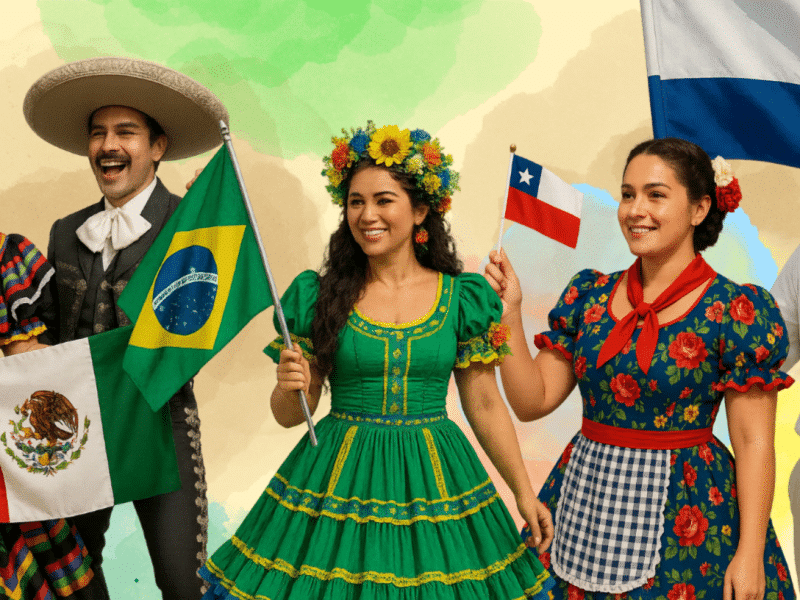The Fetish Trap: The Spicy Latina Stereotype Isn’t Now, And Has Never Been Harmless
Too often, Latinas are reduced to the “spicy Latina” stereotype–exotic, hypersexual, loud–and it comes at a cost.

Latinas come from many different backgrounds and have unique stories to tell. We encompass a rich tapestry of cultures, histories, and life experiences. Unfortunately, despite this beautiful diversity, we often face persistent stereotypes that limit and objectify us, reducing our identities to sexualized and exotic caricatures. These stereotypes have far-reaching effects on the Latina community, influencing our personal lives, careers, and overall place in society.
Sexualization and fetishization are separate but interconnected issues. Sexualization refers to the reduction of a person to their sexual attributes or capacities, essentially objectifying them. Fetishization involves objectifying a person and attributing stereotypical or fantastical traits to them based on their racial or ethnic background.

As Latinas, we frequently find ourselves confronted with a pervasive stereotype that has come to be known as the “spicy Latina.” This stereotype portrays us as hypersexual, passionate, hot-blooded, loud, and intense individuals, and is often accompanied by a strong, “exotic” accent, reducing our complex identities to a superficial and sensationalized caricature. The “spicy Latina” stereotype contributes to the harmful fetishization of Latinas, as assumptions about our supposed “passion” or “fire” are used to justify and perpetuate our objectification as mere sexual objects.
The fetishization of Latinas is further exemplified by distressing statistics. In 2024, the Pornhub Year in Review report showed that the term “Latina” ranked as the second most searched term in the U.S. Globally, it ranked as the 9th most searched term. These statistics are a stark reminder of how our ethnicity is reduced to a sexualized fantasy, reinforcing the objectification and devaluation we face.
This persistent sexualization and fetishization can have far-reaching implications for our personal and professional lives:
Personal Impact
The perpetuation of these stereotypes places us at risk of encountering uncomfortable and unsafe situations. Many Latinas find themselves subjected to unwanted sexual attention or advances solely because of these preconceived notions. “The spicy Latina is an image I had no part in creating. And yet I’m told to fit into this subordinate role. I’m not flattered because I am not your spicy Latina, nor do I ever want to be,” wrote Shantyana Lledin in a personal essay about this topic. Consequently, these stereotypes also have an impact on our interpersonal relationships, as we may feel compelled to conform to these expectations or fear being misunderstood by our partners.
Professional Impact
In professional settings, the sexualization of Latinas can serve as a barrier to our progress and adversely affect how we are treated. We may not be taken as seriously as our counterparts or, worse, experience harassment based on these sexualized stereotypes. Such objectification undermines our abilities and accomplishments, impeding our advancement and stifling our professional growth. It is a disheartening reality that our capabilities may be overshadowed or dismissed due to the focus on our perceived sexual attractiveness.
Societal Impact
The sexualization and fetishization of Latinas perpetuate systemic inequalities, exacerbating discrimination on a societal level. These prevalent stereotypes contribute to biases and prejudices that manifest in various sectors, including healthcare, law enforcement, and education. Latinas may face unequal access to quality healthcare or encounter biased treatment from law enforcement officials. Moreover, these stereotypes can limit educational opportunities and hinder academic achievements. The consequences are far-reaching, reinforcing existing disparities and impeding progress toward a more equitable society.
Mental Health Impact
The continuous objectification and devaluation of Latinas take a toll on our mental health. Being constantly portrayed as solely sexual objects and regarded that way by many in society can lead to self-esteem issues and feelings of inadequacy. The American Psychological Association (APA) reports that sexualization and objectification undermine confidence and comfort in one’s body, leading to shame, anxiety, self-disgust, depression, and other issues.
Objectification theory proposes that constant exposure to sexualized stereotypes leads women to internalize society’s perspective, resulting in self-objectification, which is linked to increased anxiety, shame, and depression. For Latinas, our identities and stories are often overlooked or distorted for the benefit of upholding stereotypes, which also contributes to a sense of marginalization and erasure.
Challenging the Stereotypes and Collective Action
The sexualization and fetishization of Latinas have profound and wide-ranging consequences that extend into our personal lives, professional endeavors, and the broader fabric of society. To confront and address these issues, we need to actively dismantle harmful stereotypes, foster inclusivity, and create a more equitable world for not only Latinas but all marginalized communities.
A critical step is to demand media representation that defies and shatters stereotypes. We need to see Latinas depicted in diverse roles that highlight our complexity as individuals with unique stories and experiences. By challenging the narrow narratives often imposed upon us, we can promote a more authentic and nuanced understanding of Latinx identities.
Advocating for Latin American history and culture to be integrated into education is equally important. By ensuring that people learn about the real lives and rich backgrounds of Latinas, we can cultivate understanding, appreciation, and respect for our heritage. “The Spicy Latina trope will cease to exist when Latinas are finally truthfully portrayed in fiction, and media allows Latina voices to be centered in discourse surrounding their stories to challenge the cultural hegemony of the white male gaze,” stated Belmont University student Gabi Martinez in a 2022 oral presentation, “Girls from the Heights: From Mexican Spitfie to Maddy Perez.”
It’s also important to confront this stereotype. By openly discussing the problems of sexualization and objectification, we can challenge people’s attitudes and foster positive change in societal perceptions. Through dialogue, education, and empathy, we can shift societal norms and foster a climate of respect and equality.
We must empower ourselves and our fellow Latinas to speak out against this brand of discrimination. Together, we can uplift one another, amplify our voices, and assert our right to be treated with dignity, respect, and equality. These fundamental principles should be extended to every individual, regardless of their background or identity.




